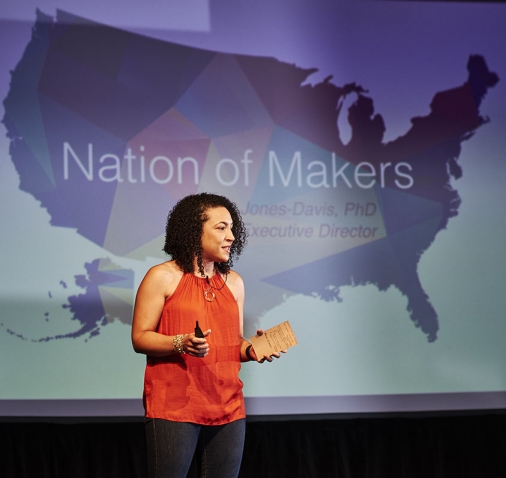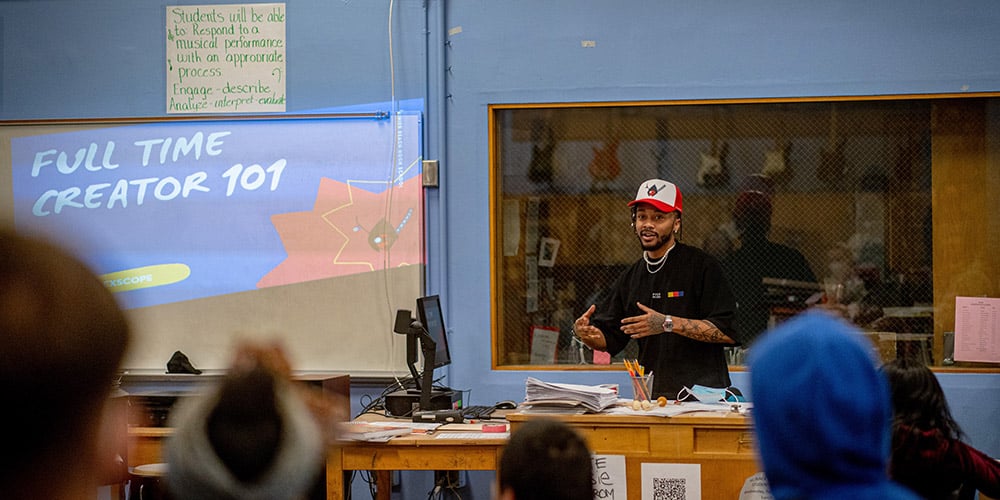Past, present, and future of makerspaces
Q&A with Dorothy Jones-Davis, Executive Director of Nation of Makers
Nation of Makers is a national nonprofit supporting America’s maker organizations through community building, resource sharing, and advocacy, within the maker movement and beyond. As Executive Director, Dorothy Jones-Davis spearheads the events, resources, and advocacy. We sat down to learn more about NoM, makerspaces, and what the future holds.

How has the concept of a makerspace evolved?
Over the last decade, makerspaces have gone from a place that’s like a gym membership, where you just drop in and make your one little project, to places that have transformed how people think about work. These operations have jumpstarted whole businesses and strategies for community success. For example, we have spaces that are doing incredible education work, filling in gaps in a post-COVID world and improving student outcomes.
They aren’t just located in somebody's garage with a bunch of bros hanging together. They are multifaceted spaces that do so many things and serve as a kind of community center. From our membership lists, we have makerspaces that are in hospitals, in end of life centers, in churches, and in libraries. And even in academic communities, students are requesting these kinds of resources and opportunities at their colleges and universities.
A makerspace is actually a gateway to better education, better jobs, and entrepreneurship. We have a partnership with the US Department of Energy, where we're helping them connect to makerspaces, as both prototyping centers for their challenges, but also to get innovators who have the skill set to create something great.
What are some myths and misconceptions around makerspaces?
I think one notion that people have about makerspaces is that they are just for hobbyists — a place to 3D print a Baby Yoda or knit a cozy blanket. Those exist and are wonderful. But makerspaces are also organizations that do incredible amounts of work that is game-changing.
Take MHub in Chicago. They do small batch to medium batch manufacturing. They are an incubator for a number of startups that are using additive manufacturing, building ecosystems in the Chicago area.
Tell us about your annual conference this past summer, NOMCON
Because it was virtual, we had fewer people attend, but we had deeper conversations as a result. And we held the sessions over the course of the entire month. Each week had a different theme, which drew different groups of attendees. Our attendees are everyone from folks that are doing making within the government to folks that are just launching a makerspace or hackerspace.
Nation of Makers has been around for six years as of this month, so we’ve learned a lot, but our content is always forward-facing. We want to understand where we have been successful, as well as where we need to do work — where are the pain points and where we, as a movement, need to go.
How do wet lab and bio science spaces fit into the world of makerspaces?
We love our bio spaces! In fact, we partner with the Global Community Bio Summit out of MIT, which is a community of bio spaces from across the world. It's a massive convening with a very bold global footprint. It's incredible because that community is doing free open public bioscience work. Even just considering the work they did during COVID — making personal protective equipment and testing devices. I'm a neuroscientist by training and that's the world that I come from, so it brings me special joy.
Can you speak to the importance of inclusivity and equity in makerspaces?

So let’s think about kids. We want all children to be makers, right? But where are the resources for them to be makers as they get older?
Of course, we want all people to have access to making. But if you pick any city and look at where the makerspaces are and who has access to them, there are structural inequities that have persisted.
Capital, for example. Land and access to property. There have been generations of systemic marginalization and policies to keep people from accessing both.
I do think there are a number of spaces working incredibly hard and very intentionally around equity and access, and also around creating inclusive spaces. We can’t ignore the perpetuation of violence against communities of color, trans people, LGBTQ, and women.
But at Nation of Makers, we have worked to move the needle forward. We have intentionally focused on creating an inclusive Nation of Makers community, ensuring our resource library has a robust collection of information about creating inclusive spaces, and we’ve been proud to partner with groups that are supporting BIPOC Makers, such as the BIPOC Makers Collective.
Why does making matter, even now?
I've said this a zillion times along with many others: Making is one of those things that makes us human.
When you look at cultures around the world, there is almost always a culture of making and creation that represents the identity of that culture. It's how we share our stories. It's how we convey how we're feeling. It’s also how we make meaning of the world and solve our most challenging problems, collectively.
The maker movement isn’t just robotics, electronics, 3D printers and knitting. To do so limits how people see themselves being represented, and the solutions we can come up with to our most difficult problems.
I think for us to reach the fullest potential what this movement can do is to embrace the maker mindset. You never know where the exciting, innovative new ideas are going to come from. So it's in all our best interest to make sure that we're creating spaces whereas many people as possible feel like they can be their fullest and most authentic selves through what they are able to make.